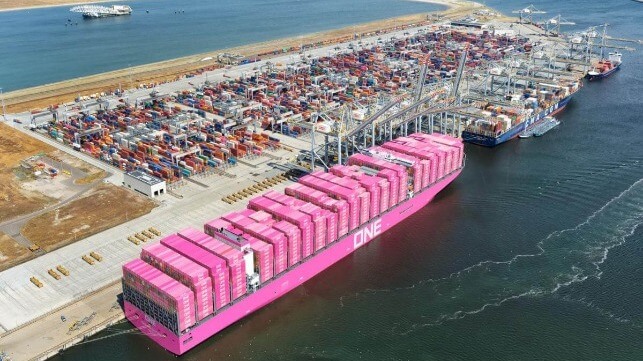
Rotterdam World Gateway, a major container terminal in the Port of Rotterdam that serves carriers like CMA CGM, Hapag-Lloyd, and Ocean Network Express (ONE), has announced plans to invest in shore power, making it the first deep-sea terminal in Europe to do so. Beginning in 2026, the terminal, with a current capacity to handle over 2.35 million TEU and two large vessels simultaneously, will start transitioning to shore power for all vessel calls.
Ronald Lugthart, CEO of RWG, emphasized the significance of this investment in shore-based power, highlighting the goal of achieving zero-emission storage and handling of containers. He expressed that alongside clients and other stakeholders, RWG aims to implement shore-based power and other sustainable measures to support the energy transition.
The terminal, which counts DP World, CMA CGM, HMM, MOL, and the Port of Rotterdam Authority among its stakeholders, is already operating CO2 neutrally and fully automated. With EU regulations requiring ships larger than 5,000 gross tons to use shore-based power by 2030 in European ports, RWG’s decision to equip its berths with shore power from 2026 is a proactive step ahead of the deadline.
Boudewijn Siemons, CEO & Interim COO of the Port of Rotterdam Authority, commended RWG for being the first European deep-sea terminal operator to invest in shore-based power, underscoring the move’s contribution to enhancing the sustainability of the supply chain passing through Rotterdam.
A letter of intent between the Port of Rotterdam Authority and RWG outlines agreements to share knowledge and data related to the construction and use of shore-based power, as well as the necessary infrastructure enhancements to accommodate this technology. Furthermore, collaborative efforts with the municipality of Rotterdam and other stakeholders aim to accelerate and expand shore-based power for sea-going vessels in the port.
In addition to its commitment to shore-based power, RWG announced an expansion program in June 2023, in collaboration with the port authority. The addition of a third deep-sea berth, expected to be operational by 2026, will further strengthen the terminal’s capabilities in handling the largest container ships globally. RWG also facilitates transshipment with inland vessels and boasts robust road and rail connectivity.

